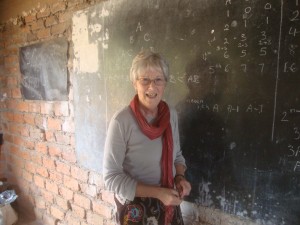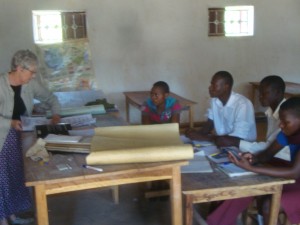Chris Smith, retired maths teacher, supporter of UHST and one time VSO Uganda volunteer has sent this informal update from her recent visit to the Humanist Schools in Uganda.
 My recent visit to Uganda came 6 years after my first arrival. I had already known about the Humanist Schools; by the end of my placement I knew Isaac Newton, Masaka, quite well; it was only a 3 ½ hour drive and I had my own vehicle. In 2012 I joined the Friendship visit and managed to get to Mustard Seed, Kamuli, for the first time. But I still hadn’t really been to any of the schools as a Maths teacher and that niggled.
My recent visit to Uganda came 6 years after my first arrival. I had already known about the Humanist Schools; by the end of my placement I knew Isaac Newton, Masaka, quite well; it was only a 3 ½ hour drive and I had my own vehicle. In 2012 I joined the Friendship visit and managed to get to Mustard Seed, Kamuli, for the first time. But I still hadn’t really been to any of the schools as a Maths teacher and that niggled.
I visited independently in February this year, at the start of the academic year, spending a week each at Isaac Newton (Masaka campus) and Mustard Seed.
I found that Primary Leaving Exam results were out late so S1 were only just starting to register. “O” level results were very overdue, so S5 (lower sixth) hadn’t started.
I observed lessons, Venn Diagrams loom large on the Ugandan curriculum, tedious and artificial, but other topics were more lively. When “supplementing” lessons I asked why and how questions. Rote learning is at the heart of Ugandan teaching, there are large classes and few resources; this can work well for Maths but there is a loss of independent thinking and flexibility.
S6 students (the A level year) sought me out when I was not in other classes. At INHS I was amazed by the standard already achieved by some of the students; they asked me about exam questions which they found difficult, I counted the years since I last taught at that level and consulted text books. Students at Mustard Seed were not as advanced, but I team taught with one of their teachers and found him to be highly professional both in the content of the lessons and the non-dogmatic way he communicated with the students.
So far so ordinary. I introduced experimental probability, coins were spun, dice rolled. Initially students were very hesitant, out of their comfort zone. I presented some of the questions I have used with my U3A “Numbers and Stuff” group; these led them to think in different ways. I spoke to teachers about positive discipline, giving praise, quick ways to assess the progress of whole classes.
 At Mustard Seed the director asked me to speak to the boarders, boys and girls separately, about Humanism but emphasising the importance of females staying in school, avoiding early sex and pregnancy. I told them about my life so far; emphasising my humble origins, being the first person in my family to be able to stay on at school after 14 and the difference that had made to my opportunities; that I have only two children so we could do our best for them and so I could work at my chosen profession. I asked what they thought education could give them. I explained that Humanists don’t have a rule book or leader, consider they can use reason to decide how to live well, can be friends to people of any religious belief or none, did not fear hell or try to act well just to reach heaven. I emphasised that the Humanist Schools welcome staff and students who followed any religion, or no religion, equally.
At Mustard Seed the director asked me to speak to the boarders, boys and girls separately, about Humanism but emphasising the importance of females staying in school, avoiding early sex and pregnancy. I told them about my life so far; emphasising my humble origins, being the first person in my family to be able to stay on at school after 14 and the difference that had made to my opportunities; that I have only two children so we could do our best for them and so I could work at my chosen profession. I asked what they thought education could give them. I explained that Humanists don’t have a rule book or leader, consider they can use reason to decide how to live well, can be friends to people of any religious belief or none, did not fear hell or try to act well just to reach heaven. I emphasised that the Humanist Schools welcome staff and students who followed any religion, or no religion, equally.
Buildings, equipment and infrastructure have improved and numbers of students have increased; the purposeful atmosphere is just the same and what I most enjoy about my visits.
Uganda has very many places of worship; some explicitly offer cures and wealth, it is the churches themselves that benefit. Religious belief is often used as the excuse for persecution of “the other”, homosexuals the most extreme example at present, and it often overlays superstition, acceptance of witchcraft, inappropriate treatments from local healers.
Can the Humanist Schools make a difference? Emphatically, yes. Anything we can do to demonstrate atheists being generous and trying to lead good lives, and to encourage the use of reason rather than dogma is worth the effort.
Chris SmithFebruary, 2014
Impressions of the Humanist schools from UK visitor
Posted: March 18, 2014 by Steve Hurd
Chris Smith, retired maths teacher, supporter of UHST and one time VSO Uganda volunteer has sent this informal update from her recent visit to the Humanist Schools in Uganda.
I visited independently in February this year, at the start of the academic year, spending a week each at Isaac Newton (Masaka campus) and Mustard Seed.
I found that Primary Leaving Exam results were out late so S1 were only just starting to register. “O” level results were very overdue, so S5 (lower sixth) hadn’t started.
I observed lessons, Venn Diagrams loom large on the Ugandan curriculum, tedious and artificial, but other topics were more lively. When “supplementing” lessons I asked why and how questions. Rote learning is at the heart of Ugandan teaching, there are large classes and few resources; this can work well for Maths but there is a loss of independent thinking and flexibility.
S6 students (the A level year) sought me out when I was not in other classes. At INHS I was amazed by the standard already achieved by some of the students; they asked me about exam questions which they found difficult, I counted the years since I last taught at that level and consulted text books. Students at Mustard Seed were not as advanced, but I team taught with one of their teachers and found him to be highly professional both in the content of the lessons and the non-dogmatic way he communicated with the students.
So far so ordinary. I introduced experimental probability, coins were spun, dice rolled. Initially students were very hesitant, out of their comfort zone. I presented some of the questions I have used with my U3A “Numbers and Stuff” group; these led them to think in different ways. I spoke to teachers about positive discipline, giving praise, quick ways to assess the progress of whole classes.
Buildings, equipment and infrastructure have improved and numbers of students have increased; the purposeful atmosphere is just the same and what I most enjoy about my visits.
Uganda has very many places of worship; some explicitly offer cures and wealth, it is the churches themselves that benefit. Religious belief is often used as the excuse for persecution of “the other”, homosexuals the most extreme example at present, and it often overlays superstition, acceptance of witchcraft, inappropriate treatments from local healers.
Can the Humanist Schools make a difference? Emphatically, yes. Anything we can do to demonstrate atheists being generous and trying to lead good lives, and to encourage the use of reason rather than dogma is worth the effort.
Chris SmithFebruary, 2014
Category: News